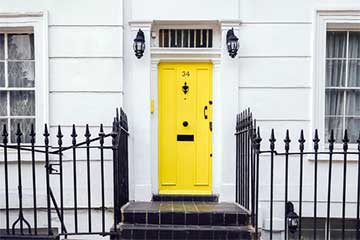Exchange of contracts Explained
If you have reached this stage, most likely is that you are very excited and you are already planning your moving in steps. However, keep in mind that until the exchange of contracts is not complete, both buyer and seller of the home can pull out of the deal without “penalties”. Use our “Exchange of Contracts” guide to find out more about the final stages of buying a property.
It is exciting to get offers on a property, but it is not guaranteed until you exchange the contracts. Find out more in this article about what is involved in exchanging contracts on your new home.
When two legal firms from both sides (the buyer and seller) exchange signed contracts, and the buyer pays the deposit, it is called exchanging contracts. At this point, the agreement for buying or selling the property becomes legally binding, and after signing the contracts, none of them can back out.
- Exchanging contracts is important because it marks the point where both parties have to agree to make transactions legally.
- It decides the completion date and confirms that all the necessary paperwork is completed or guaranteed.
- After exchanging contracts, no party can back out. If it happens, there would be penalties for the party in any case.
This article will cover:
- What Is The Meaning Of The Term “Exchange Of Contracts” ?
- Significance Of Exchanging Contracts
- Buyer’s Responsibilities
- Responsibilities Of Buyer’s Solicitors
- Seller’s Responsibilities
- Responsibilities Of Seller’s Solicitors
- When Does An Exchange Take Place?
- What Is An Exchange Deposit?
- What is the Exchange Deposit for?
- How Long between Exchange and Completion?
- What Happens on Exchange and Completion Same Day?
Need A Free Estimate?
- Fully qualified RICS professional surveyor
- Affordable, fast and thorough surveys
- Clear, precise and easy to understand report
When the offer is accepted, there are several things to do before exchanging contracts. It is necessary to be proactive, organized, and communicative to avoid hold-ups and reduce the risk of the sale falling through.
- Buyers should conduct an independent house survey to check any serious issues such as damaged property. If it needs any repairs, the buyer should negotiate the price.
- If the buyer takes any mortgage, he/she should get a written mortgage offer.
- Arrange building insurance before the date of exchange.
- Ask other questions about what he is concerned or confused about.
- Sign the contract and other required documents and return them to the solicitor.
- He/She should ensure that all the repairs that the seller has to make to the property are mentioned in the contract.
- He/She should complete local searches to see any environmental or planning issues.
- If the property is leased, he/she should go through the lease carefully.
- He/She should answer all the required queries raised by the buyer and explain them to the buyer.
- Check the contract thoroughly and send it to the buyer for signing.
- Discuss the date of completion with the seller’s solicitor.
- Arrange to pay a deposit on the buyer’s behalf.
- Wait for the results of the survey and be prepared to negotiate accordingly.
- Collect all the papers for any work that you have done on the property. You may provide proof of planning permission.
- Keep all the forms ready, including property information, fixtures, and fitting forms.
- Inform the building insurer that you are selling the house and cancel the policy. Also, arrange the new building insurance for the property you are moving from the date of exchange.
- If applicable, arrange a mortgage statement and finance for a new home.
- Fill in and check all the required forms with the seller and send them to the buyer’s solicitor.
- Answer all the queries raised by the buyer’s solicitors.
- Draft a contract for the sale and note down the details of any work that seller has committed to making to the property. After that, send it to the buyer’s solicitor.
- Discuss the date of completion with the buyer’s solicitor.
Once the seller and buyer have all the necessary documents ready, contracts can be exchanged.
The seller and buyer will sign the identical forms. Both sides’ solicitors will then exchange the contracts at a decided time. At this moment, the agreement becomes legally binding, and no one can back out without penalties.
Most exchanges occur over the phone, reading solicitors read out the contracts. After that, they immediately send the documents to one another.
When both seller and buyer exchange the contracts, the buyer has to pay an exchange deposit to the seller. This deposit is usually 10% of the property value. It may vary from the amount of mortgage you put into the property.
Suppose 10% is too much for the buyer because he is buying with a 95% mortgage and can only pay 5% before the mortgage is complete. In that case, the buyer’s solicitor should negotiate the exchange deposit to 5%.
The main purpose of the exchange deposit is to guarantee the seller that you will buy the property. If you cancel after the exchange, the seller has the right to keep the exchange deposit.
Need A Free Estimate?
- Fully qualified RICS professional surveyor
- Affordable, fast and thorough surveys
- Clear, precise and easy to understand report
It can take several weeks or even months to get from the offer acceptance to the exchange of contracts as it is probably the longest phase of home-buying process.
Both buyers and sellers should be active and organize as quickly as possible the building survey. Also it helps to respond to any potential queries as quickly as possible to speed up the entire process.
When both parties exchange the contracts, the solicitors discuss a completion date. Often completion dates are set after two weeks of exchanging contracts, but buyer or seller can take more time if required.
As a buyer, your role is to wait for your solicitor’s confirmation that your deposit and mortgage are transferred to the seller and completion has taken place.
The conveyancers duty is to electronically transfer the money from one bank account to another. If all the process goes smoothly, you should have your keys from the estate agent in the day of completion, when the seller vacated already the property.
So, if the exchange of contracts and completion day are the same day, then the signed contracts are delivered to the parties involved and immediately after the owners are given the keys to their new home.
Written by Danil P.
29th Nov 2021 (Last updated on 3rd Jan 2023)
11 minute read





